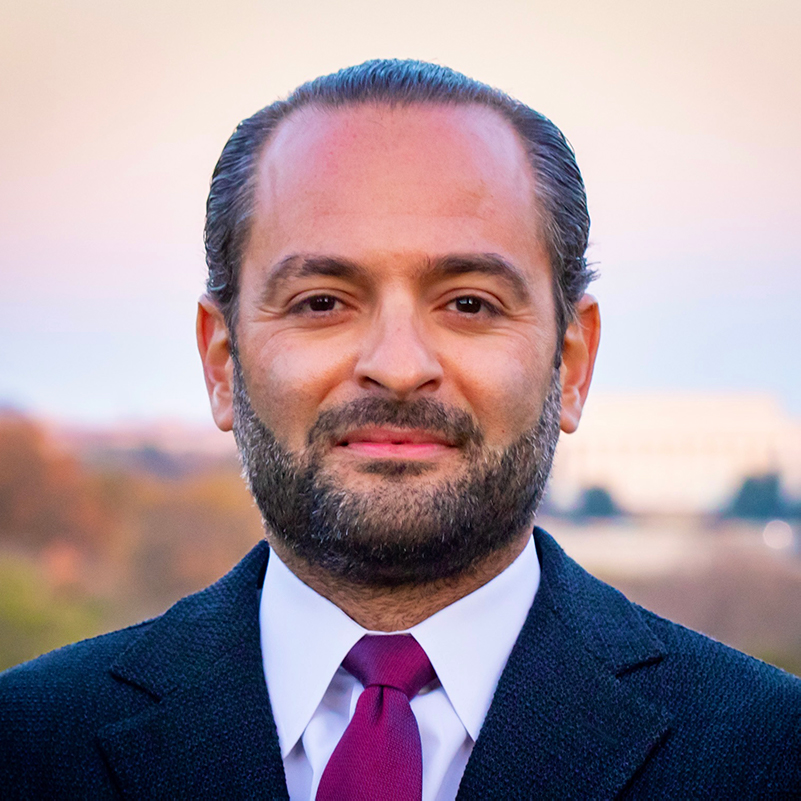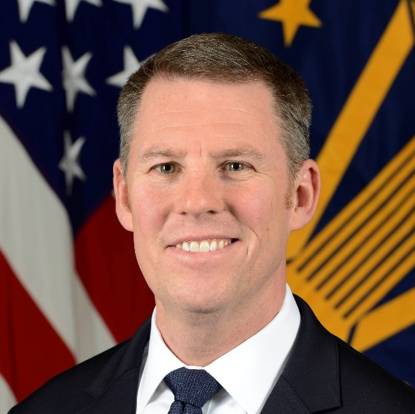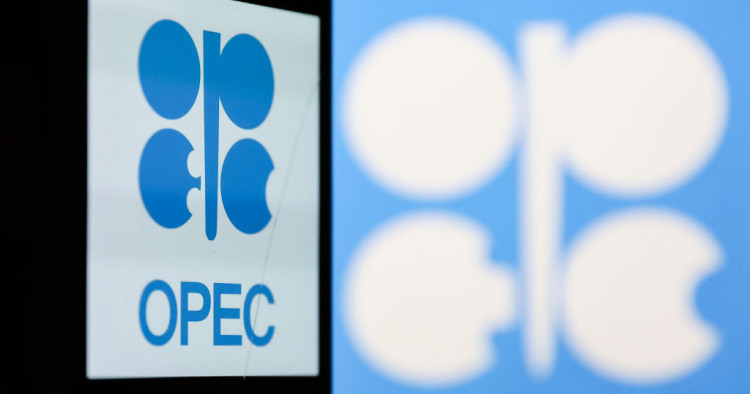Contents:
- For Washington, the OPEC+ decision further complicates the regional map
- For Saudi Arabia, the OPEC+ decision is a declaration of independence
- OPEC+ decision marks a major shift in US ties to Arab Gulf countries
- OPEC’s production act: Let the numbers do the talking
- Could Russia become a source of OPEC+ discord?
- America’s adversaries are the real winners if the US halts security cooperation with Saudi Arabia
- Iran emboldened but also challenged by US-Gulf tensions over energy
- Caspian oil producers stay loyal to OPEC+
- Strategic competition and re-evaluating US-Saudi ties
For Washington, the OPEC+ decision further complicates the regional map
Brian Katulis
Vice President of Policy

-
The OPEC+ decision sparked a political firestorm in the U.S. and was strongly criticized by the Biden administration and a growing chorus of voices in Congress.
-
This episode underscores the fraught and fragile bilateral ties between the United States and Saudi Arabia as well as the fluid and complicated dynamics in the regional and broader geopolitical landscape of today.
Last week’s decision by OPEC+ to cut oil production by 2 million barrels per day sparked a political firestorm in the United States. Representing the biggest cut in oil production since the start of the pandemic, the move was strongly criticized by the Biden administration and a growing chorus of voices in Congress in what looks like just the start of a major backlash against OPEC+ countries, particularly Saudi Arabia.
“There will be consequences,” President Joe Biden warned when asked about the decision this week, a day after Senator Bob Menendez (D-NJ), the chairman of the Senate Foreign Relations Committee, called for a freeze on U.S. cooperation with Saudi Arabia, including arms sales.
OPEC+, a group that includes Russia, made this move as a collective decision, but it’s not surprising that Saudi Arabia is in the spotlight given the frayed bilateral U.S.-Saudi relations over the last five years after the murder of journalist Jamal Khashoggi and criticisms about Saudi Arabia’s human rights record and its actions in the Yemen war.
Saudi officials describe this oil production decision as one focused on their country’s economic self-interest given what they see as emerging clouds in the global economy. But the move sends a negative signal about limits to how much Saudi Arabia is willing to support the broader cause of stability and prosperity in the world. The decision adds to the growing impression in America that the kingdom is moving closer to Russia’s camp during the Ukraine war, also at a time when Russia is aligned with Saudi Arabia’s top adversary, Iran. Ironically, the move came as Iran was facing greater isolation and criticism. This OPEC+ decision has shifted attention away from Iran and to Saudi Arabia in ways that won’t be good for smooth and stable U.S.-Saudi relations.
What might the Biden administration and Congress do in response to this move? First, the strong criticism of Saudi Arabia is a sign of the trust and confidence gap that endures in the bilateral relationship. Whether it’s an indication of harsher measures that impose a cost on Saudi Arabia remains to be seen.
The Biden administration could dip into the Strategic Petroleum Reserve to counteract potential oil and gas price increases that may come; but one downside is that those reserves are already at their lowest level in nearly four decades. Some have talked about limiting U.S. gas exports to expand domestic supplies, but this could harm European partners facing a potentially tough and costly winter.
Some of the options to impose costs on Saudi Arabia and express disapproval include moving forward with “NOPEC” legislation in Congress, a proposal that would empower the Justice Department to use U.S. antitrust laws to file lawsuits against OPEC+ countries and their state-owned oil companies. There are questions about what effect this legislation might actually have, including practical legal questions about how U.S. courts could enforce antitrust rulings against a foreign country. Some have expressed concerns that the legislation might incentivize other countries to take retaliatory action.
On other fronts, a number of voices in Congress have called for cutting off security cooperation and arms sales to Saudi Arabia, a not-so-new proposal that aims to downgrade U.S. military ties with the kingdom. The practical challenge with this idea is that it raises questions about what the United States will do in its broader regional security strategy at a time when the prospects for a new Iran nuclear deal seem low and regional tensions, due in large part to Iran’s de-stabilizing regional actions, remain high. What would a plan B on Iran look like if the United States implemented some of these measures aiming to impose costs on Saudi Arabia? That’s a key question that requires a serious debate.
This latest episode not only underscores the fraught and fragile bilateral ties between the United States and Saudi Arabia but also the fluid and complicated dynamics in the regional and broader geopolitical landscape of today. 2022 is not 1991, when America had just won the long Cold War against the Soviet Union and emerged victorious in a short Middle East war that protected Saudi Arabia from Iraq’s aggression.
Looking at this more complicated map, the United States will need to assess the best moves to bring it closer in tactical and strategic alignment with a range of countries — Saudi Arabia is one of the most difficult ones to get right.
Follow on Twitter: @Katulis
For Saudi Arabia, the OPEC+ decision is a declaration of independence
Gerald M. Feierstein
Distinguished Sr. Fellow on U.S. Diplomacy; Director, Arabian Peninsula Affairs

-
What the OPEC+ decision makes clear is that the effect of Saudi decision-making on U.S. national interests will be, at the most, one factor among many for the Saudi leadership and will not be determinative.
-
It’s unlikely that the decision will have a substantial short-term impact on ties, but it likely cements in place the transactional nature of the bilateral relationship.
After a campaign season spent excoriating Saudi Arabia and its de facto ruler, Crown Prince Mohammed bin Salman, Joe Biden made the difficult decision this summer that he would need to visit the kingdom with a proposal to open a new chapter in the perennially challenged bilateral relationship. What he suggested in Jeddah was to move relations to a new strategic plane. Defense and security and a stable energy market were still pillars of the relationship, and the president made clear that the U.S. commitment to regional security was unchanged. But he was also clear that he did not come to talk about oil. Instead, as the joint communique issued at the conclusion of the summit meeting reflected, Biden saw the visit as an opportunity to engage the Saudis and their Gulf Cooperation Council (GCC) partners on a cooperative agenda to address a broad array of issues, including global economic recovery efforts, climate change, food security, and global health.
The reality of Saudi leadership as the driving force in the OPEC+ decision to cut the consortium’s output by two million barrels a day makes clear that the Saudis were unmoved by the Biden initiative and uninterested in turning the page on bilateral relations. Indeed, a number of U.S. observers have cast the Saudi position at the Vienna meeting as a purposeful slap at the Biden administration, an allegation vigorously denied by those speaking on behalf of Riyadh. In fact, given the softness in the global energy market, the rising prospect of a worldwide recession, and the reality that actual OPEC production was already well below the posted daily output, the real impact of the decision on prices at the gas pump is difficult to assess.
What the decision does make clear, however, is that the effect of Saudi decision-making on U.S. national interests will be, at the most, one factor among many that the Saudi leadership will consider before drawing their conclusions and will not be determinative. Furthermore, the fact that the production cut might facilitate Russian aggression in Ukraine appears not to have been a factor at all or might even have been a positive factor as a gesture to Russian President Vladimir Putin.
Cooperation on issues of mutual importance still serves the interests of Washington and Riyadh. Thus, it’s unlikely that the OPEC+ decision will have a substantial short-term impact on the bilateral relationship. Nevertheless, the decision likely cements in place the transactional nature of the relationship. Most importantly, it frees the Biden administration, which was uncomfortable with the Saudi ties in any event, to pursue more aggressively U.S. initiatives, including, in the short term, maximizing domestic oil and gas production and doubling down, over the longer term, on the move away from fossil fuels and toward renewables and conservation.
OPEC+ decision marks a major shift in US ties to Arab Gulf countries
Firas Maksad
Director of Strategic Outreach, Senior Fellow

-
The Biden administration must carefully thread the line between domestic political pressures and sound policies that advance America’s long-term standing abroad.
-
America and Arab Gulf states need to restructure their partnership to account for a much-changed geopolitical landscape.
Another crisis in U.S. relations with Arab Gulf states appears to be upon us after last week’s announcement by OPEC+ countries that they will be slashing oil production by 2 million barrels per day despite pleading from the Biden administration that they refrain from doing so. The timing is unsuitable for the electoral calendar of many Democrats, only weeks ahead of midterm elections in early November, and the White House is now vowing to re-evaluate ties to Saudi Arabia.
Oil prices have slipped some 40% since March, and OPEC+ countries worry that the projected slowdown of the global economy — and with it the demand for oil — will slash their incomes. Naturally, they chose to prioritize their own prosperity over the electoral prospects of American politicians.
Saudi Arabia, the dominant player in the oil cartel, remains deeply unpopular in American political circles, so there is a predisposition to blame it for OPEC’s unanimous decision, and to call for swift retaliatory measures. While emotionally satisfying and politically popular, any U.S. response must remain calibrated. An overreaction will push all parties further up the escalation ladder at a time of global crises. It will also further erode American standing in the region and the world.
Unlike during the Pax Americana that followed the collapse of the Soviet Union, Arab Gulf states have more recently been diversifying their foreign policy options away from the United States by broadening their political, economic, and even security engagements with China, Russia, and other powers. Their drive to balance away from America is why Saudi Arabia and the United Arab Emirates have been resisting outright condemnation of Russia for its invasion of Ukraine, which enabled them to use their influence with Moscow to broker the release of Ukrainian and Western hostages.
Such an approach, they surmise, affords them leverage in their ties to Washington, and helps assure them greater stability when U.S. security commitments to the region appear to be waning. As one senior Saudi official recently put it, “The days of making decisions based on phone calls from Washington are behind us.” Saudi Arabia in particular, an increasingly confident member of the Group of 20 (G20) largest economies, is trying to project itself as a “middle power” rather than an American satellite state.
How the Biden administration reacts to the increasingly independent streak of its Arab Gulf partners could set the tone for years to come and risks undermining mutual interests. If President Joe Biden yields to pressure within his party to sign the proposed NOPEC legislation into law, thereby allowing for anti-trust lawsuits to be brought against members of OPEC+ in U.S. courts, Saudi Arabia and other Arab Gulf countries will likely counter. They may accept Chinese offers to buy their oil using yuan rather than dollars. They could also choose to reduce their considerable holdings of U.S Treasury bills. Such steps would undercut the dominance of the dollar as the international reserve currency of choice and undermine Washington’s global financial leverage at a time of great economic uncertainty.
Similarly, halting U.S. military sales to Arab Gulf states could have unintended consequences, including accelerating their diversification of weapons purchases away from American defense companies to the benefit of competitors in Russia and China, but also France and the United Kingdom. This when successive U.S. administrations have been pushing Arab Gulf states to limit their growing defense cooperation with its global strategic competitors.
A rash escalatory response, as advocated by many members of Congress, does not serve the interest of either side. The U.S. has a vital strategic interest in maintaining dominance over energy sources in the Middle East, on which China and allies in Europe and East Asia are dependent for their economic livelihood. It is imperative not to create opportunities for other aspiring global powers to make further inroads into the region.
The Biden administration must carefully thread the line between domestic political pressures and sound policies that advance America’s long-term standing abroad. In trying to do so, it could continue to vocally express its displeasure and disappointment at OPEC+ and Arab Gulf countries. It can also delay key requests, including some military sales, to remind its partners that America remains the senior partner in the relationship.
But this will not be enough. Together, America and these Arab nations need to restructure their partnership to account for a much-changed geopolitical landscape, particularly considering the return of war to the European continent and the scramble for energy resources it has unleashed. Such a strategic framework agreement would reaffirm U.S. security guarantees and specify the terms of engagement should Arab Gulf states come under attack from Iran and/or its proxies. In return, they must relinquish their hedging strategy and adopt more cooperative energy policies.
Failure to reimagine America’s partnership with these OPEC+ countries will condemn the relationship to becoming a much more transactional and limited one — one in which calls from the White House sometimes go unanswered.
Follow on Twitter: @FirasMaksad
OPEC’s production act: Let the numbers do the talking
Ruba Husari
Non-Resident Scholar

-
The demonization of Middle Eastern producers accused of driving oil markets higher seems misguided when historical facts and actual produced barrels are taken into consideration.
-
Whatever 2023 brings, OPEC and its producer allies are determined to prevent oil prices from falling below the unannounced floor of $90 per barrel.
OPEC+’s unusual decision last week to cut crude oil production by a hefty 2 million barrels per day (bpd) from November surprised many and drew ire from a number of quarters. The organization of major producers and its allies were blamed for most of the world’s ills, as if there is no war in Ukraine, the dollar is not gaining strength by the day, and central banks are not raising interest rates at a pace unseen in recent years amid growing inflation worldwide. While one could argue that there is a real threat of higher oil prices and economic recession, the demonization of Mideast producers accused of driving oil markets higher seems misguided when historical facts and actual produced barrels are taken into consideration.
Historically, OPEC was never seen as very disciplined when it comes to cutting its oil output if demand was there to absorb any incremental barrels, unaccounted for in the official tally of members’ production. This “cheating” or overproducing beyond members’ assigned quotas is well documented over the years. If this is not happening at the moment, it is simply because the members have run out of spare production capacity. In fact, the organization is not collectively hitting its nominal assigned quotas, making the 2-million-bpd cut more of a fiction than a reality. Following the ministerial meeting in Vienna last week, Saudi Oil Minister Abdulaziz bin Salman admitted that the actual cut in output will be around 1-1.1 million bpd since OPEC members have been missing the previously agreed production baseline for months. Analysts tracking members’ production and exports expect the actual cut, if it happened, to be less than 1 million bpd and possibly as low as 06-0.8 million bpd.
The move to try to balance supply and demand was meant to pre-empt a possible slow-down in oil demand as a result of slower economic activity globally, driven by a threat of recession and interest rate hikes by leading central banks in the U.S. and Europe. Those factors, combined with geopolitical insecurity, are triggers of volatility — something that OPEC traditionally hates. The specter of negative oil prices is only two years old and unknowns are abundant: from the expected December EU oil sanctions against Russia that will ban EU members from importing Russian crude and the proposed G7 price cap on Russian oil exports to domestic instability in Iran and Libya to production woes at African producers Angola and Nigeria. Furthermore, indicators out of China, the world's biggest crude importer and the second-largest consumer of oil after the United States, are pointing to a contraction in the economy on the back of persistent COVID-19 restrictions. All this means that markets are set for a roller coaster in the coming months. Whatever 2023 brings, OPEC and its producer allies — whose pact has incidentally been extended till the end of 2023 — are determined to prevent oil prices from falling below the unannounced floor of $90 per barrel.
One positive aspect of the cut in crude output is that spare capacity will now increase, especially in Saudi Arabia and the United Arab Emirates, which will bear the burden of most of the cut in production, and, to a lesser extent, other Gulf producers. If global consumption of oil increases and the demand on Mideast oil rises, possibly on the back of the woes of Russian crudes, then expect talk in the oil market to revert back to “cheating” members of OPEC producing beyond the new production ceiling announced last week.
Follow on Twitter: @IraqOilForum
Could Russia become a source of OPEC+ discord?
Emily Stromquist
Non-Resident Scholar

-
Among the numerous sources of volatility and uncertainty in the current oil market, Russia has the potential to introduce some of the greatest havoc, which may also negatively affect its fellow OPEC+ members.
-
To respond to Western pressure on its oil exports, Russia could either rapidly ramp up sales before announced EU and G7 restrictions come into force, or it may follow through on its threats to significantly limit exports to those participating Western countries.
The dynamics at play in the Oct. 5 announcement by OPEC+ to cut production have been well documented. There are clear signs the oil cartel has grown frustrated with attempts by the United States, the European Union, and others to influence the market through methods ranging from price caps to Strategic Petroleum Reserve (SPR) releases. And speculation is rife about the degree of strain this latest decision will place on U.S.-Saudi relations. But among the numerous sources of volatility and uncertainty in the current oil market, Russia has the potential to introduce some of the greatest havoc, which may also negatively affect its fellow cartel members.
The latest OPEC+ decision will have no direct impact on Russia. The latter was already producing well below its quota owing to Western sanctions and will not have to make further cuts to remain in compliance. Russia and key OPEC members were aligned on the latest output reductions due to the tightening market and desire to maintain higher prices. Still, just days after the announcement, prices started to slip, reflecting market concerns about the global economy and particularly the latest data showing slowing economic activity in China.
One of the notable, lingering sources of uncertainty concerns the G7 oil price cap and how it will be calculated and introduced. Combined with the EU’s embargo on seaborne deliveries of Russian crude that will go into effect on Dec. 5, Russia could forcefully respond either by rapidly ramping up sales to shore up its revenues before the embargo and price cap come into force, or it may follow through on its threats to significantly limit exports to the countries that participate. The latter action would add further bullish pressure on prices and harm emerging and developed markets alike.
In the case of the former, however, a burst of distressed Russian cargoes in the immediate future could replace supplies from Saudi Arabia and other Gulf producers in certain markets, especially in Asia. There are signs Riyadh may be concerned about such a possibility, as it held prices steady for its Arab Light grades in Asia for November despite buyer expectations of a price increase. This could hint at one possible weak spot in intra-OPEC+ coordination.
Ultimately, ambiguity around Russian responses, the potential for U.S. retaliation for the latest OPEC+ cuts, and possible divergence between OPEC and Russia over their respective geopolitical priorities suggest that Moscow’s OPEC+ compatriots are likely to be kept on their toes in navigating this unpredictability.
America’s adversaries are the real winners if the US halts security cooperation with Saudi Arabia
Melissa Horvath
Non-Resident Senior Fellow

-
Calls in Washington to cut off defense-sector cooperation with Saudi Arabia will increase regional instability and allow global adversaries like Russia, China, Iran, and violent extremist non-state actors to fill the void.
-
The price of suspending security cooperation will be a U.S. loss of influence, not only with Saudi Arabia but also with other partners in the region and beyond, whose view of the U.S. as an inconsistent or unpredictable partner will only grow.
OPEC+’s decision to cut oil production by 2 million barrels a day has generated a new round of calls to punish Saudi Arabia by leveraging security cooperation programs and removing U.S. troops stationed in the region. On Tuesday, the president promised consequences for Saudi Arabia and said he will immediately begin reevaluating the U.S.-Saudi relationship.
Senator Bob Menendez (D-NJ) promised to block all future sales to Saudi Arabia, while Representative Ro Khanna (D-CA) and Senator Richard Blumenthal (D-CT) called for bicameral legislation to put a hold on all arms transfers to the kingdom. Senate legislation, introduced on Tuesday, would include a one-year halt to all Foreign Military Sales (FMS) and Direct Commercial Sales (DCS) to Saudi Arabia, and it would also include freezing logistics and program support for U.S. systems already in operation.
The U.S. executes the FMS program primarily as a tool of foreign policy and often pauses assistance to send a message. Lawmakers blocked or delayed arms sales to Saudi Arabia in recent years to signal disapproval over Riyadh’s intervention in the Yemeni civil war as well as the murder of Saudi-American journalist Jamal Khashoggi. Similarly, the U.S. has previously paused security cooperation programs with Pakistan, Egypt, and Bahrain. It is not uncommon, or unreasonable, to leverage FMS as an instrument to influence partners. However, a one-year freeze on arms sales to Saudi Arabia will create many second- and third-order effects that benefit our adversaries — and it may not be in the best interest of the United States to do so.
The U.S. State Department reports $126.6 billion in active FMS sales and since 2014 has authorized over $8.2 billion in DCS to include sophisticated missile defense systems like Terminal High Altitude Area Defense (THAAD), Patriot Advanced Capability-3 systems, F-15SA fighter aircraft, Airborne Warning and Control System (AWACS) modernization, M1A2 Main Battle Tanks, CH-47F Chinook helicopters, surface combat ships, and various precision missiles and munitions.
If the U.S. follows through on threats to terminate security cooperation with Saudi Arabia, other powers will fill the gap. Moreover, the U.S. will have lived up to the “abandonment narrative” that is already prevalent across the region. Indeed, many Arab partners, including Saudi Arabia, have for years been diversifying their security relationships and notably maintain active defense and economic ties with Russia and China. The U.S. thus risks effectively shutting itself out of the region and being unable to secure its own defense interests, disrupt violent extremist organizations (VEOs), protect vital sea routes, or ensure the free flow of resources through three of the world’s most critical maritime chokepoints.
Additionally, terminating FMS and DCS support will drastically reduce Saudi Arabia’s defense capabilities and capacity. Even a Saudi decision to transition to Russian or Chinese systems will not be rapid enough to immediately address their current defense needs. It will bolster the Iranian regime’s relative influence and power in the region and render Saudi Arabia, and the Gulf Cooperation Council (GCC) collectively, less effective in defending against Iranian and proxy threats. Finally, as the State Department notes, Saudi Arabia is a critical U.S. partner on a wide range of regional security issues, and a founding member of the Global Coalition to Defeat ISIS. Halting security cooperation will decrease the kingdom’s ability to defend against VEOs, including efforts to disrupt global financial and facilitation networks, increasing threats to U.S. national security.
When asked about OPEC’s decision to cut output, Secretary General Haitham al-Ghais pointed out that “everything has a price.” The price of suspending security cooperation will be a U.S. loss of influence, not only with Saudi Arabia but also with other partners in the region and beyond, whose view of the U.S. as an inconsistent or unpredictable partner will only grow. The winners will be Russia, China, Iran, and
Iran emboldened but also challenged by US-Gulf tensions over energy
Alex Vatanka
Director of Iran Program and Senior Fellow, Frontier Europe Initiative

-
OPEC+’s decision has little direct impact on Iran as an oil producer and exporter since the country was already operating below capacity due to the impact of American sanctions.
-
Despite its close relations with Russia, Iran considers both Saudi Arabia and the UAE as two of its key regional rivals; so any deepening of Moscow’s ties with the Gulf states is a delicate matter for Tehran.
Petroleum cartel OPEC+ and the West are blaming each other for the former’s Oct. 5 decision to cut oil production by 2 million barrels a day. OPEC+’s announcement has little direct impact on Iran as an oil producer and exporter since the country was already operating below capacity due to the impact of American sanctions. As of August 2022, Iran has been pumping around 2.6 million barrels a day, most of which is consumed domestically; around 1 million barrels is exported, mostly to China, which effectively ignores U.S. sanctions on Tehran. In short, Iran is presently a marginal player in global oil markets, which is also true about its weight inside OPEC+.
This does not mean Iran has no interest in OPEC+ or its discord with Western oil consumers. In fact, the long-term geopolitical implications of this schism are of critical significance for Tehran. Above all, the Iranians will watch how the OPEC+ decision shapes intra-cartel relations between Russia and the Gulf oil producers. While Tehran has close relations with Moscow, it considers both Saudi Arabia and the United Arab Emirates as two of its key regional rivals. Hence any deepening of Moscow’s ties with the Gulf states is a delicate matter for Tehran.
The issue is not limited to the fact that the Saudis and the UAE cut back oil production — a move from which Russia was a net beneficiary as it has not had to reduce its own output as part of the OPEC+ production quota agreement. The other factor is that both Riyadh and Abu Dhabi are clearly determined to stay close to Moscow despite intense pressure from Washington. On Oct. 11, less than a week after the OPEC+ production cut decision, UAE President Mohammed bin Zayed (MbZ) was in St. Petersburg, where he met with President Vladimir Putin and reaffirmed the UAE’s desire to pursue dialogue with Russia on a number of issues, including the war in Ukraine.
Time will tell how Washington responds to yesterday’s UAE-Russian summit, but there are already calls in the U.S. Congress to “rethink” relations with Saudi Arabia for its cooperation with Russia in the context of OPEC+ and beyond. Meanwhile, a scenario where the Gulf states move closer to Moscow, and perhaps away from Washington, would represent a reality that Tehran has not had to face before.
Notably, oil price policy would not be Tehran’s most pressing concern as Russia and the Gulf states look for win-win collaboration. In fact, during MbZ’s visit to St. Petersburg, Iranian state-run media mostly focused on any signs that Russia and the UAE might find a way to cooperate on reconstruction in Syria — a country where Iran has, since 2012, invested heavily but so far failed to make serious inroads as far as post-war economic projects are concerned. Iran, therefore, will closely watch and see if OPEC+ becomes a catalyst for closer Russia-Gulf cooperation that can impact Tehran’s interests not only in energy but also its broader regional projects and ambitions.
Follow on Twitter: @AlexVatanka
Caspian oil producers stay loyal to OPEC+
Rauf Mammadov
Non-Resident Scholar

-
Azerbaijan and Kazakhstan have adhered to OPEC+’s oil production quota allocations since joining the cartel in 2016.
-
The last eight months have undoubtedly pushed Kazakhstan and Azerbaijan to seriously reconsider their attitudes toward Russia, but their commitment to OPEC+ remains driven by the economic realities of being heavily dependent on hydrocarbon exports.
Caspian oil producers Azerbaijan and Kazakhstan — long lauded as potential alternative non-Russian sources of energy for Europe — ended up supporting OPEC+’s sharp production cuts announced on Oct. 5. Both countries have adhered to the Russia- and Saudi Arabia-led cartel’s quota allocations since becoming a member of the grouping in 2016.
Their initial decision to join the cartel was not a surprise. It was in the best interest of both Azerbaijan and Kazakhstan at that time to see the oil price rebound from the low $30s per barrel, and OPEC+’s production quota allocations presented the quickest means to achieve that. It also likely proved challenging to turn down Riyadh and Moscow’s favorable business proposal: Russia had maintained a weighty presence in the Caucasus and Central Asia for centuries, while Saudi Arabia’s pivot to the region was picking up speed. Finally, the geopolitical reality Kazakhstan and Azerbaijan faced five or six years ago was quite different. Russia was not tied down in a large-scale war. Despite its recent occupation of neighboring Ukraine’s territory in 2014, Moscow received merely a slap on the hand from the international community and continued its assertive foreign policy throughout the post-Soviet space.
But those geopolitical circumstances changed radically starting on Feb. 24, 2022, the day Russia re-invaded Ukraine. The Kremlin’s unbridled aggression left Kazakhstan and Azerbaijan between a rock and a hard place. Moscow’s audacious attempt to extinguish the sovereignty of neighboring Ukraine predictably unsettled both Caspian littoral countries. Although Kazakhstan and Azerbaijan have unequivocally expressed their support for Ukraine’s territorial integrity since the first days of the war, the two countries refrained from actively taking an anti-Russian stance comparable to that of, for example, the Baltic states.
Instead, Baku and Astana have adhered to cautious diplomacy vis-à-vis their northern neighbor due to Moscow’s still significant — even if recently somewhat more weakened — influence in their neighborhood. For Kazakhstan, Russia remains highly important from an economic standpoint. The Caspian Pipeline Consortium (CPC) pipeline, Kazakhstan’s key oil export route, stretches across southwestern Russia, terminating at the Russian Black Sea port of Novorossiysk. In July, a Russian court again temporarily ordered the halt of oil flows via the CPC, the third such interruption since Russia’s re-invasion of Ukraine in February. Consequently, Kazakhstan has been looking for other export routes for its oil that would reduce the country’s dependence on Russia, looking at possibilities of sending volumes across the Caspian via the South Caucasus or — though far less realistic at the moment — even southward through Iran.
The last eight months have undoubtedly pushed Kazakhstan and Azerbaijan to seriously reconsider their attitudes toward Russia. This security-driven reconsideration, however, is unlikely to impact their commitment to OPEC+. Although the geopolitical realities have changed, the economic realities remain the same. Both countries are heavily dependent on hydrocarbon exports and equally interested in seeing oil prices stay high, which OPEC+ policies can help guarantee.
Follow on Twitter: @RaufNMammadov
Strategic competition and re-evaluating US-Saudi ties
Mick Mulroy
Non-Resident Senior Fellow and Co-Director of the Yemen Steering Initiative

-
From a security perspective, the decision by OPEC+ to reduce oil production by 2 million bpd was a mistake. Whether intended or not, it was a gift to Russia.
-
The desire to re-evaluate the U.S.-Saudi relationship is understandable, but dramatically changing it would not be in the interest of the U.S. or the region.
From a security perspective, the decision by OPEC+ to reduce oil production by 2 million barrels per day was a mistake. Whether intended or not, it was a gift to Russia, which will undoubtedly use the increase in revenue to fight its unprovoked and unlawful war in Ukraine. It comes at a time when the Russians were having significant difficulties keeping up with their losses in weapons systems, vehicles, and ammunition on the battlefield. This latest production cut provides them a lifeline.
If fuel prices rise as expected, that will also increase the cost of food, which is already elevated due to the war in Ukraine and Russia’s earlier blockade of Ukrainian grain exports. That will have a disproportionate impact on developing countries, some of which, like Somalia and its neighbors in the greater East Africa region, are currently experiencing a serious drought and widespread famine. The OPEC+ decision to decrease production in order to drive up the price of oil should be re-evaluated, taking into account the impact it has on the war in Ukraine and on the overall global cost of food, especially in areas already pushed to the brink.
For these reasons, the desire to re-evaluate the relationship between Saudi Arabia and the U.S. is understandable. However, this strategic relationship goes back to 1933 for a reason: It is very important to the security of both countries. Dramatically changing the nature of this relationship would not be in the interest of the United States or the region.
Suppose we choose to stop or suspend weapons sales to Saudi Arabia. In that case, we will be replaced by China and Russia, the two countries we correctly identified as our top two strategic competitors in our National Security Strategy. Our influence with Saudi Arabia may not be what it should, but if we essentially abandon them and their legitimate security concerns, especially in regard to Iran, we will not have any influence over them. We would essentially concede the strategic competition to our adversaries, who will gladly fill our place.
OPEC+, led by Saudi Arabia, should reverse its decision to reduce oil production. It is critical that all nations stand against Russia’s flagrant violation of the international rules-based order, an order they all benefit from themselves. The United States should always be evaluating its relationships to make them more effective for our purposes. But abandoning the relationship with Saudi Arabia and leaving it to China and Russia will not be in our interest and will do nothing to positively influence future Saudi decisions to be more in line with our national security objectives and values.
Follow on Twitter: @MickMulroy
Photo by Jakub Porzycki/NurPhoto via Getty Images
The Middle East Institute (MEI) is an independent, non-partisan, non-for-profit, educational organization. It does not engage in advocacy and its scholars’ opinions are their own. MEI welcomes financial donations, but retains sole editorial control over its work and its publications reflect only the authors’ views. For a listing of MEI donors, please click here.













